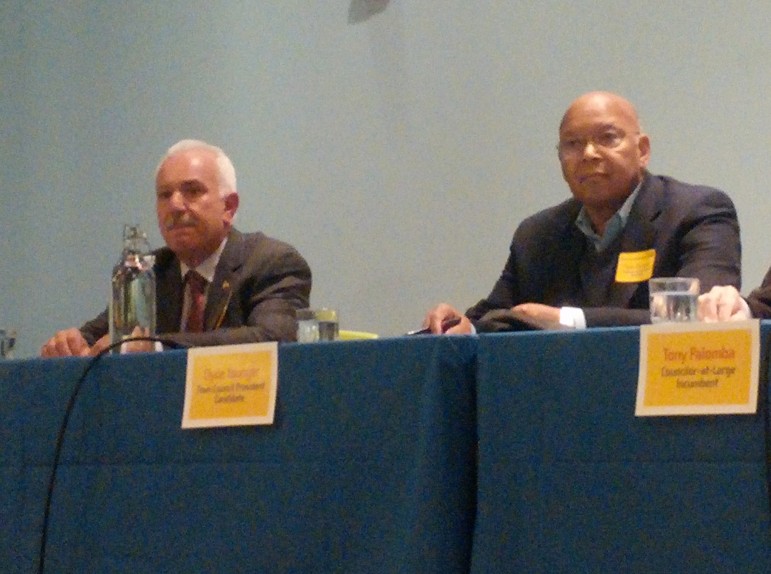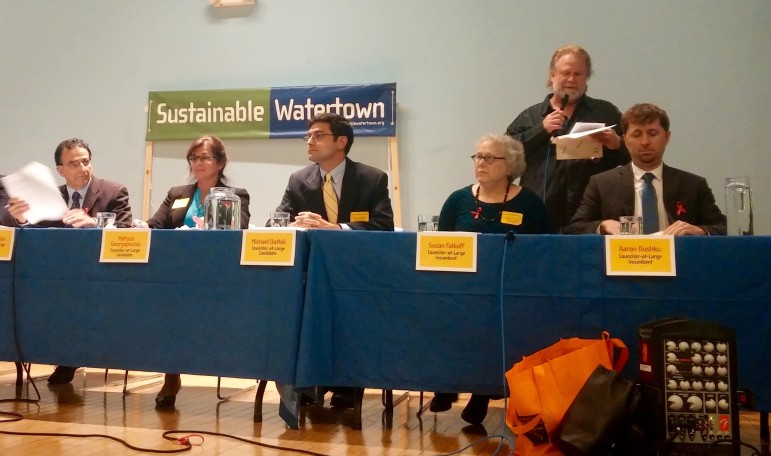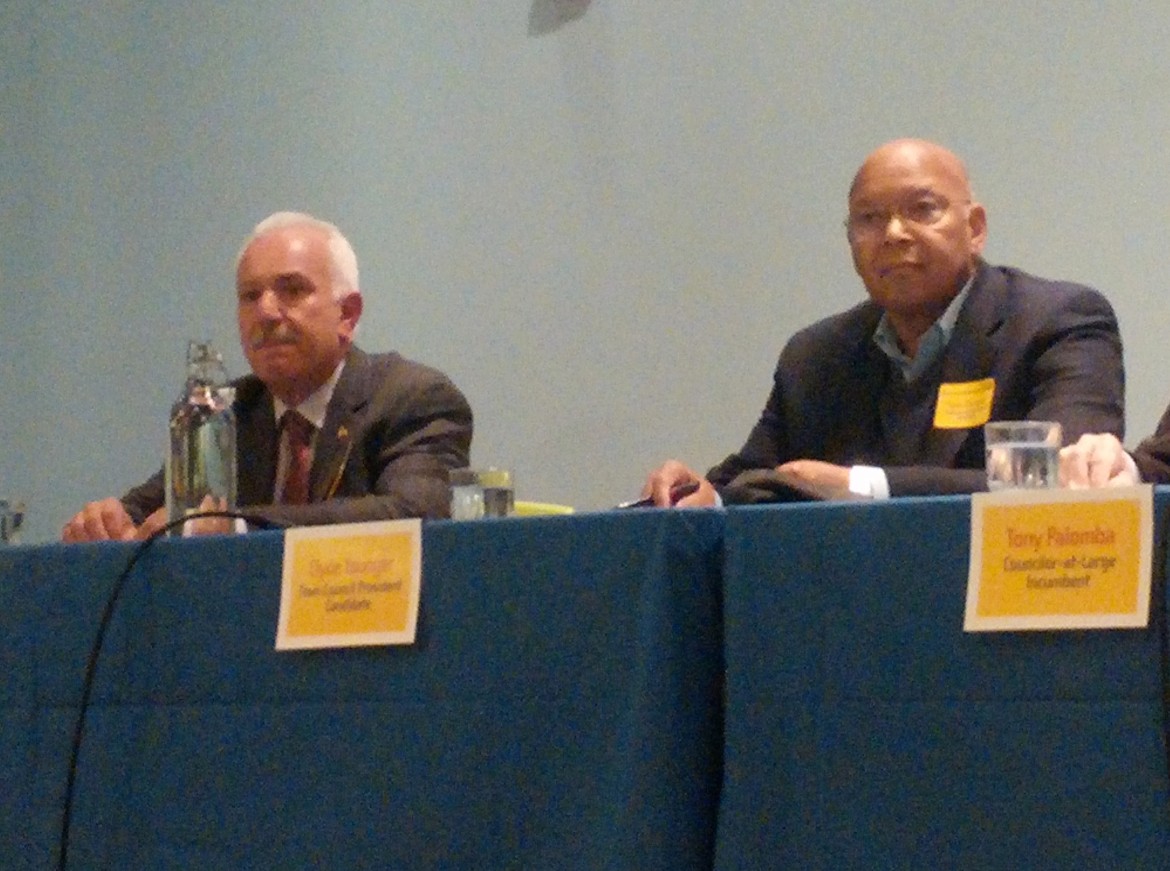
Charlie Breitrose
The two candidates for Town Council President, incumbent Mark Sideris, left, and former president Clyde Younger, spoke at the Sustainable Watertown Candidates Forum on Monday.
Sustainable Watertown hosted the second of two Town Council Candidate Forums Monday night, this time featuring the candidates for Council President and Councilors At-Large.
Moderator Karen McDonald asked questions put together by members of Sustainable Watertown, a citizens group focused on issues including development, transportation and the environment. The election will be held Tuesday, Nov. 3.
Attending the forum at the Apartments at Coolidge School on Monday were Candidates for Town Council President – incumbent Mark Sideris and former president Clyde Younger – along with those running for Concilor At-Large – incumbent Tony Palomba, challenger Michael Dattoli, challenger Patryce Georgopoulos, incumbent Susan Falkoff and incumbent Aaron Dushku.
Development
Sustainable Watertown’s questions included how the Town Council could balance the fact that there is a shortage of housing in town while still preserving the unique character of neighborhoods and protecting them from “tear down” projects.
Sideris said it might be time for the Council to look at changing the zoning requirements for building lot coverage to make it harder to tear down a home and put up larger ones. He also noted that when zoning changes are made to stop something from happening, developers often find a way to do it using other rules.
Younger said he would like to see moratorium on tear downs in residential areas until the town can be figure out in which direction it wants to go. He also said people should be educated about how they could own a two-family home, make some rental money and/or keep their children in town. That would also prevent multi-family homes from becoming condos.
One way to preserve character of neighborhoods, Palomba said, would be to have neighborhood preservation committees in different areas of town. He suggested having a pilot to see how it works. Creating housing is not enough, he said, it also needs to be affordable to people in town.
Georgopoulos worries about the impact of new development in residential areas.
“We have to realize tear downs have an effect on neighborhoods,” Georgopoulos said. “We could form committees to talk to residents and see what they want in their neighborhood.”
Limits on what people can do really worry homeowners, Dattoli said, but he said it would not be as strict as a place like Nantucket where homes are limited to handful of colors. Dattoli said he spoke to residents in the near west side where a lot of tear downs have occurred, and some are not objectionable.
“When you ask what they like about it, it really comes down to which one fits in with the neighborhood,” Dattoli said.
The concern for Falkoff about tear downs is the new project tends to be much larger, have more units or sometimes more buildings on the same property. She wants to make sure people they are affordable to a range of people.
Dushku said one of his objections to the new projects is when a single family home is removed and a two-family one is built, there are four cars instead of two. He would like to see buildings aimed at Millennials, many of whom do not rely as much on cars. That could save the number of spaces built in garages.

Charlie Breitrose
The Councilor At-Large candidates answered questions posed by Sustainable Watertown. Seated, from left, Tony Palomba, Patryce Georgopoulos, Michael Dattoli, Susan Falkoff and Aaron Dusku. Standing is Sustainable Watertown’s Joe Levendusky.
Traffic
Candidates were asked whether they thought traffic would get worse in town, and what could be do to reduce it.
Getting a local shuttle to supplement the MBTA bus service would help transportation needs, Falkoff said, and she would make her top budget priority hiring a full-time transportation planner.
“No body is thinking comprehensively about the whole town and traffic,” Falkoff said. “We can do more to get more cars moving better.”
For Dushku, the problem will get worse as the population grows, unless something is done to stop it. He would like to see data collected from garages and other places to see how many cars are going in and out and see if the paces are needed. Also, the town could learn about the needs of major employers in town by having them do surveys of how their employees get to work.
Sideris said he would like to see a transportation manager brought it, but he is not sure whether it should be full-time or contracted out.
“I think it has to be a consultant first,” Sideris said. “We need to get data before saying, ‘OK, we need a full time person.'”
Younger said he would like for the town to take a time out and create a vision for the next 10 to 15 years. He thinks some sort of traffic monitors for key intersections could help, too.
“I was on Arsenal Street the other day and it took three lights to get onto Galen Street,” Younger said. “That shouldn’t happen.”
Palomba noted that the $40,000 of the $130,000 the Council committed to transportation management has already been spent. He would like at least some of it to be used to hire someone to be in charge of transportation demand management.
The traffic has grown with the economic grown in town, said Georgopolous, and she said the town needs to figure out how to manage it. Along with having a transportation manager, she suggested working with employers to create ride sharing opportunities and work to improve public transportation.
Dattoli said he supports having a transportation manager. He said he would love to see streets like he saw in a town in New Zealand where artists displayed their work to passing shoppers, who were not worried about the cars on the street. The cars traveled at a good pace and shared the road with bicyclists. Dattoli acknowledged that would be a long-term goal.
Open Space
Sustainable Watertown asked about how candidates would seek to increase open space in town.
Dattoli said this is an important goal, and noted that the design guidelines recommend developers include open space available to the public in new projects. He also wanted to make sure more space was available for the Watertown Community Gardens, and added that the DCR Park on the Charles River near the Ryan Skating Arena is underused and in poor condition.
The town should figure out how to best use the open space it has, Georgopoulos said. She noted that the proposed renovation of the Grover Street entrance of Filippello Park is still being studied, but options are limited for gardens because they can only dig 2 feet down into the soil before hitting potentially hazardous soil from the former landfill.
Palomba said he wants to see more open space, but with little available land, there are competing needs for any parcel.
“We may need land for a new school,” Palomba said. “It could be a high school or an elementary school, so where is it going to go?”
Younger said the need for open space is great, and he would be interested in seeing ask the taxpayers if they would be willing to purchase properties with buildings on and tear them down to create more open space.
Sideris said a few years ago thought was given for the town to purchase land across from Gore Estate, but did not act on it. He said it may take the town taking land by eminent domain to create more open space. He also noted a new pocket park is being built as part of the new apartment/retail project at Arsenal and Irving streets.
Dushku said he hears all the time from youth sports parents saying they don’t have enough access to recreation fields. He also wants to see more space for community gardens.
“We need a process where we can determine where in the community have a dearth of open spaces,” Dushku said. “Opportunities are arising everyday but we can’t take advantage if we are not ready.”
Falkoff said there is an opportunity to create green space around homes. The amount of un-built on land around homes includes both grass and landscaping, as well as paved areas such as driveways. She suggested a standard be made for the percent of impervious space – such as lawns – a residential property should have.
Read about the first Sustainable Watertown Candidate Forum, featuring those running for District Councilor, by clicking here.
